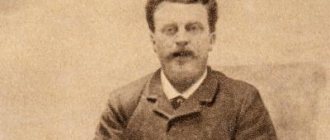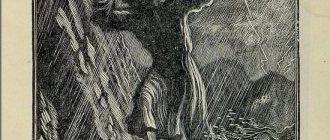Patriotic views of the author, expressed through the lyrical hero
The first poems were written under the influence of Byron's work, so they are filled with romantic images, but the later lyrics are seriously different and are more realistic and mature. Literary scholars divide the poet’s work into stages :
- early – from 1828 to 1837,
- late – from 1837 to 1841.
It is no secret that the poet most often uses his lyrical hero to reflect his position in relation to various situations. What feelings does the lyrical character have for the Motherland?
Early period
In the early poems, the lyrical hero is distinguished by his determination and uncompromisingness, and reacts vividly to any injustice. The early hero is a kind of romantic, which is typical of works of Western literature, a multifaceted personality whose goal is freedom.
He is brave and desperate, challenges tyrants to battle and shouts loudly about oppression, while at the same time the lyrical hero experiences love for his country.
The poet's ardent, strange passion for the Motherland is reflected in the lyrics, along with his desire to change what oppresses ordinary people.
Late period
At this stage, serious changes occur in the hero’s worldview, although the theme of the Motherland is regularly present in Lermontov’s lyrics. This is an already experienced adult man who is distinguished by prudence and deliberation. These changes can be read in Borodino, from which the second stage of creativity begins, characterized by its realism. However, unlike others, the author does not completely abandon romanticism, but combines it with realism. His later poems are a mixture of these two techniques.
“Borodino” no longer represents just a lyrical hero, but a person who took part in important events, acting as a narrator. He is not distinguished by beauty, sublimity or nobility - he is a simple warrior fighting for a state. The lyrical hero of the poet’s late work experiences a feeling of sadness and melancholy. He no longer reacts ardently to all events, but doubts and is afraid of defeat. You can also notice that the later heroes of the work do not speak on their own behalf , but represent the entire people.
Throughout his work, thanks to changes in the thoughts and actions of the heroes, one can trace how the thoughts of the poet himself changed, how he grew up and no longer ardently reacted to the terrifying reality, but reasoned, pondered and doubted the correctness of the path of the state, looking for inactive clashes with government, but no real changes in its policies.
Mikhail Yuryevich Lermontov is one of the most famous poets, who is a symbol of the heyday of Russian literature. Lermontov, moreover, was an excellent artist and quite well versed in mathematics. He was a man of mood who could explode at any moment. He was cocky and loved to play pranks on others, sometimes going overboard. When Mikhail was born, the midwife unexpectedly predicted that the boy would not die a natural death. During his short life, the poet participated in three duels and died during one of them at the age of 26.
Mikhail Lermontov did not have outstanding external characteristics: his short stature, hunchback and lameness did not give him masculine charm, but he had brilliant human charisma. Lermontov had a very strange addiction - to dissolve planned marriages. He simply pretended to be in love with someone else's bride, and showered her with flowers, poems and other signs of attention. When it was clear that the wedding would not happen, the poet simply became indifferent to the lady or openly told her about the prank.
It is interesting to note that Mikhail Yuryevich is the second cousin of that same Stolypin, the reformer and creator of the famous agrarian reform. However, Lermontov never met him, since he died before his birth.
Nikolai Gogol once incredibly accurately said about Lermontov: “Some unfortunate star...” Indeed, the writer’s fate was not easy and shrouded in mystical fate. His literary heritage is so closely intertwined with our everyday life that it has become almost popular. These are 23 sensitive and melancholic statements by Mikhail Yuryevich Lermontov.
1. Desires!.. What good is it to wish in vain and forever?.. And the years pass - all the best years!
2. The person who needs you will always find a way to be there.
3. To love... but who?.. For a while - it’s not worth the effort, But it’s impossible to love forever...
4.So life is boring when there is no struggle
5. It’s boring, and sad, and there’s no one to give a hand to in a moment of spiritual adversity...
6. I don’t expect anything from life. And I don’t feel sorry for the past at all. I'm looking for freedom and peace! I would like to forget myself and fall asleep!
7. What is the life of a poet without suffering? And what is the ocean without a storm?
8.Love was without joy, separation will be without sadness...
9. Life is like a ball: You spin around - it’s fun: everything around is light, clear... I just returned home, took off my crumpled outfit - And forgot everything, and was just tired.
10. Shaming a liar, making fun of a fool And arguing with a woman is the same as drawing water with a sieve; Deliver us from these three, O God!
11. How terrible it is for us to drag out this life in solitude. Everyone is ready to share the fun - No one wants to share the sadness
12. A person who absolutely wants something forces fate to give up.
13. There are strange people who treat friends like clothes: they use them until they wear out, and then they throw them away.
14. And the whole world hated you so that you could love you more.
15. All this would be funny, If it weren’t so sad...
16. Believe me - happiness is only where they love us, where they believe us!
17. It’s sad, but I must admit that the purest love is half mixed with pride.
18. Why deep knowledge, thirst for glory, talent and ardent love of freedom when we cannot use them?
19. The poet died! - a slave of honor, - Fell, slandered by rumor, With lead in his chest and a thirst for revenge, Hanging his proud head!.. The poet's soul could not bear the shame of petty insults, He rebelled against the opinions of the world Alone, as before... and was killed!
20. For every bright moment or sweet moment, You will pay fate with tears and prayers.
21. Below him is a stream of lighter azure, Above him is a golden ray of sun... And he, rebellious, asks for the storm, As if there is peace in the storms!
22. We barely touched the cup of pleasure, But we did not save our youthful strength.
23. My laughter is as heavy as lead: It is the fruit of heart emptiness.
Every word of the poet is permeated with some unprecedented sadness. It was as if Lermontov was born with a destined destiny and knew about it.
Analysis of the poem "Motherland"
The theme of the Motherland in Lermontov’s work is regular, but is most clearly visible in “Motherland” - a work filled with longing and concern for the Fatherland. Analysis of a lyrical work includes determining the genre, idea and artistic techniques used by the author.
Genre
The poem was created during the Caucasian exile, when love for the Motherland and longing for it overwhelmed Mikhail Yuryevich.
The lyrical work is written and corresponds to the genre of reflection and reflection, since in it the author talks about the fate of the country, a simple village and people, and all this against the backdrop of beautiful nature. The author sympathizes with the difficult fate of the peasants, which he accepts as his own.
He correlates the future of the village and the country, filling the existence of the former with philosophical meaning. The poem reflects love for the country and longing for its path.
Idea and structure
Talking about the strong connection between nature and people, the author is delighted with the successes of people and saddened by their defeats. Here one can clearly see disgust for the ruling class, for the nobility, who do not understand their subjects and plunge them into the abyss of poverty and disease. And ordinary peasants evoke compassion and admiration. There are two feelings in the poem :
- indignation at the masters and their indifference to ordinary people,
- homesickness.
The idea of the work is hidden in a single phrase: “I love my fatherland, but with a strange love!” Repetition of verbs is used to indicate this: “I like to ride in a cart”, “I like smoke”, etc.
In its structure, the work consists of two parts that are different in size and meaning. Solemn introduction - The Motherland in the natural sense is loved by the author, so he begins by describing the beauty of endless fields and dark forests. There is a clear distinction between the concepts of “homeland” and “power”.
This is not an accusatory poem, but a poetic one, into which the author puts his despair and resentment for the decline in the country and the enslaved people. This is the work of an exile calling on all future Russian people to love their country.
This is interesting! The problem of status and the place of the individual in the world: man and society - essay, reasoning
Aphorisms and quotes
Mikhail Lermontov in the mentique of the Life Guards Hussar Regiment. Painting by Peter Zabolotsky (1837).
Mikhail Yuryevich Lermontov (1814 - 1841) - great Russian poet, prose writer, playwright, artist.
Sadness is a cruel ruler.
Evil begets evil.
The benefits that we lose receive double value in our eyes. The less often we are spoiled by happiness, the sweeter it is for us to indulge in assumptions and dreams.
There was love without joy, Separation will be without sadness.
Believe me - happiness is only where they love us, where they believe us!
Love is like fire - it goes out without food.
Fear love: it will pass, It will disturb your mind with dreams, Longing for it will kill you, Nothing will help you to resurrect.
Russian young ladies for the most part feed only on platonic love, without mixing into it the thought of marriage; and platonic love is the most restless.
In nature, opposing causes often produce the same effects: a horse falls on its feet equally from stagnation and from excessive riding.
Time is like a fickle and capricious lover: the more you chase after her, the more you try to keep her, the sooner she leaves you, the sooner she cheats.
A genius chained to an official's desk must die or go mad, just as a man with a powerful physique, but a sedentary life and modest behavior, dies of apoplexy.
The soul either submits to natural inclinations, or fights with them, or defeats them. This results in the villain, the crowd and people of high virtue.
If, friend, you feel sad, don’t sulk, don’t be angry: Everything will pass over the years - Smile and be sad.
Women only love those they don't know.
Breed in women, as in horses, is a great thing. It is mostly revealed in the step, in the arms and legs; especially the nose means a lot. A correct nose in Russia is less common than a small leg.
Life is eternity, death is only a moment.
A fool who dreamed of finding his earthly paradise in a woman alone.
Life is like a ball: You spin around - it’s fun: everything around is light, clear... I just returned home, took off my crumpled outfit - And I forgot everything and was just tired.
Life is not a reward for the vanquished.
Of two friends, one is always the slave of the other, although often neither of them admits this to himself.
It's not death that I'm afraid of. Oh no! I'm afraid to disappear completely.
The story of happy people is never interesting.
How terrible life is for us to drag out this shackle alone. Everyone is ready to share the fun: No one wants to share the sadness.
How often do we mistake for a belief a deception or a lapse of reason.
I was involuntarily struck by the ability of the Russian person to apply himself to the customs of those peoples among whom he happens to live; I don’t know whether this property of the mind is worthy of blame or praise, only it proves its incredible flexibility and the presence of this clear common sense, which forgives evil wherever it sees its necessity or the impossibility of its destruction.
It is easy to rule a people if they are passionate about one common passion.
The world for me is a deck of cards, Life is a bank: fate threatens, I play, And I apply the rules of the game to people.
Many calm rivers begin with noisy waterfalls, but none jump and foam all the way to the sea. But this calmness is often a sign of great, albeit hidden strength: the fullness and depth of feelings and thoughts does not allow frantic impulses; the soul, suffering and enjoying, gives itself a strict account of everything and is convinced that it should be so; she knows that without thunderstorms the constant heat of the sun will dry her out.
We drink from the cup of existence With closed eyes, Wetting the golden edges with Our own tears.
Several sorrows are not as dangerous as one deep one.
There is nothing more paradoxical than the female mind. It is difficult to convince women of anything: you need to bring them to the point that they convince themselves. To learn their dialectics, you need to overturn in your mind all the school rules of logic.
Despair knows no boundaries.
Sometimes gray hair can be deceiving: So a centuries-old bottle covered with moss Keeps a stream of boiling wine.
The happiest people are the ignorant.
Friends are not always friends.
Joys are forgotten, but sorrows are never forgotten.
Disappointment, like all fashions, starting from the highest strata of society, descended to the lower ones, who carry it through, and those who are truly bored most of all try to hide this misfortune as a vice.
The Russian people, this hundred-armed giant, would rather endure the cruelty and arrogance of their ruler than his weakness; he wants to be punished - in fairness, he agrees to serve - but he wants to be proud of slavery, wants to raise his head to look at his master, and will forgive him for the excess of vices rather than the lack of virtues.
The devil himself can’t figure out why those moving backwards move faster among us.
Conscience is more accurate than memory.
So there are moments, brief moments, when, crowded together, all the torments of hell Flock to the heart and gnaw! Centuries of sadness are worth those minutes...
The same empty person who is completely filled with himself.
To find out whether the earth is beautiful, To find out whether we are born into this world for freedom or prison.
When, in barren Rus', Having parted with false tinsel, will Thought acquire a simple language And a noble voice of passion?
What are passions? - After all, sooner or later their sweet illness Will disappear at the word of reason; And life, as you look around with cold attention, is such an empty and stupid joke...
I love my enemies, although not in a Christian way. They amuse me, they stir my blood. To be always on guard, to catch every glance, the meaning of every word, to guess the intention, to destroy conspiracies, to pretend to be deceived and suddenly with one push to overturn the entire huge and laborious edifice of their cunning and plans - this is what I call life.
He boasts that he is definitely Russian; But if all the people were like that, then I would leave Rus'.
Our proud tongue does not bend, But we bend good-naturedly.
Russia has no past; it is all in the present and the future.
From his youth, He lived with the government purse as if it were his own treasury.
I look sadly at our generation! Its future is either empty or dark, Meanwhile, under the burden of knowledge and doubt, It will grow old in inaction. We are rich, barely out of the cradle, from the mistakes of our fathers and their late minds, And life already torments us, like a smooth path without a goal, Like a feast at someone else’s holiday. We are shamefully indifferent to good and evil. At the beginning of the race we wither without a fight; In the face of danger they are shamefully indifferent, And in the face of power they are despicable slaves...
Tongue and gold are our dagger and poison.
4.8 / 5 ( 21 voice )
The image of Russia in Lermontov's lyrics
The homeland in his works is represented as a strong power, but one can also hear anxiety and grief for the homeland and its population. At the same time, he wants to show his enemies his passion for the Fatherland, although, being exiled, this is especially difficult for the author.
The author never tires of admiring the beauty of Russian nature in every work. This is reflected in Lermontov’s quotes about his homeland:
“Her steppes are coldly silent,
Its boundless forests sway"
“..And on a hill in the middle of a yellow field
A couple of white birches
Important! Birches - this Russian folk symbol was first identified by Mikhail Yuryevich in his poems.
The homeland in the poem looks like “a country of slaves, a country of masters.” And its image is multifaceted: a great power with a multi-volume history, rich in nature, whose people are oppressed, and whose nobility is having fun and does not notice the general social decline.
Analysis of the verse Motherland
Lermontov's lyrics in Russian literature
Quotes from Mikhail Yurievich Lermontov
And he, the rebellious one, asks for the storm, As if there is peace in the storms!
From "Sail" (1832).
And you don’t know what it means when a man cries!
From "Masquerade" (1835).
Ah, gifts! What won’t a woman do for a colored rag!..
From “Hero of Our Time” (1838-1840), Bela.
A lonely sail whitens in the blue sea fog
From "Sail" (1832).
There was love without joy, separation will be without sadness
From "The Treaty" (1841).
In love, as in anger, I am unchanged and great
From "The Demon" (1838).
In your ink, gentlemen, there is not even any caustic bile, but just dirty water.
From Journalist, Reader and Writer (1840).
All this would be funny if it weren't so sad
From “Alexandra Osipovna Smirnova” (1840).
Where there is a society of women, the upper and lower circles will now appear.
“Hero of Our Time” (1838-1840), story “Princess Mary”.
Where can we fools drink tea?
From “A Hero of Our Time” (1840), story “Princess Mary”.
Fool who dreamed of finding his earthly paradise in a woman alone
From "Masquerade" (1835).
Anger only spoils the blood - play without getting angry.
From "Masquerade" (1835).
Yes, there were people in our time
From "Borodino" (1837).
A restless spirit, a vicious spirit
From "The Demon" (1838).
Pathetic babble of excuses
From "The Death of a Poet" (1837).
Women only love those they don't know
From “A Hero of Our Time” (1840), story “Princess Mary”.
Life without love is so bad! And what, tell me, is a man who is gray-haired an object of passion?
From “Tambov Treasurer” (1838).
Sounded like a bell on the veche tower on days of celebrations and troubles of the people
From "The Poet" (1839).
And you will be the queen of the world, my first friend
From "The Demon" (1838).
And everything that he saw before him, he despised or hated
From "The Demon" (1838).
And someone put a stone in his outstretched hand
From "The Beggar" (1830).
And nothing was reflected on his high brow
From "The Demon" (1838).
And it’s boring, and sad, and there’s no one to give a hand to
From “Both Bored and Sad” (1840).
And often a gigantic thought starts the spring of an ardent mind...
From ➤ “Masquerade” (1835).
The ideal of girls, one of the glorious Russian faces
From “Tambov Treasurer” (1838).
Shamefully indifferent to good and evil
From "Duma" (1838).
Every dwarf considers his work great
One of the favorite sayings of the poet M.Yu. Lermontov.
Like a deserted leopard, angry and wild
From “Mtsyri” (1839).
What a hellish torment to sit all evening tête-à-tête with a beauty at eighteen years old
From “Tambov Treasurer” (1838).
Whoever has never been to the top of Ivan the Great, who has never had the opportunity to take one look at our entire ancient capital from end to end, who has never admired this majestic, almost boundless panorama, has no idea about Moscow
From “Panorama of Moscow” (1834).
Whoever does not bend now will not achieve anything
From "Masquerade" (1835).
I loved often, I hated more often, and most of all I suffered!
From "Masquerade" (1835).
I love in you my past sufferings and my lost youth.
From “No, it’s not you I love so ardently...” (1841).
I love my fatherland, but with a strange love!
From "Motherland" (1841).
Dreams of poetry, the creation of art, do not stir our minds with sweet delight...
From "Duma" (1838).
I'm sad... because you're having fun
From “Why” (1840).
My heaven, my hell in your eyes
From "The Demon" (1838).
Moscow, Moscow!.. I love you like a son, Like a Russian - strongly, passionately and tenderly!
From “Sashka” (1836).
We will be as happy as we can, let them be as they want!
From “The Charming One” (1832).
You want to fill your life, but you run away from passions. You want to have everything, but you don’t know how to sacrifice; You despise people without pride and heart, and you yourself are the toy of those people
From "Masquerade" (1835).
The poet's soul could not bear it
From "The Death of a Poet" (1837).
Isn't it true that in ancient times everything was better and cheaper?
From "Masquerade" (1835).
Slave of honor
From "The Death of a Poet" (1837).
There is nothing more paradoxical than the female mind: it is difficult to convince women of anything; they must be brought to the point where they convince themselves;
From “Hero of Our Time” (1838-1840), story “Princess Mary”.
You have no homeland, you have no exile
From "Clouds" (1840).
Neither day nor night, neither darkness nor light
From "The Demon" (1838).
But in our time it has been decided that everything ancient is funny
From “Tambov Treasurer” (1838).
But free youth is strong
From “Mtsyri” (1839).
But I managed to stick my weapon into my throat and turn it twice
From “Mtsyri” (1839).
A golden cloud spent the night on the chest of a giant rock
Quote from the poem “Cliff” (1841) by the Russian poet Mikhail Yuryevich Lermontov (1814 – 1841).
Oh self-love! you are the lever with which Archimedes wanted to lift the globe
From “Hero of Our Time” (1838-1840), story “Princess Mary”.
One but fiery passion
From “Mtsyri” (1839).
There is plenty of room for everyone under the sky, but he alone constantly and in vain quarrels - why?
From “I am writing to you by chance, really” (1840).
Decency, taste - everything is so conventional
From "JOURNALIST, READER AND WRITER" (1840).
Farewell, unwashed Russia, land of slaves, land of masters
From “Farewell, Unwashed Russia” (1841).
Even if I am known as an Old Believer, I don’t care - I’m even glad
From “Tambov Treasurer” (1838).
Let the bigot look with contempt at our lawless union
From “The Charming One” (1832).
The world revolves on stupidity and deceit
From "Masquerade" (1835).
Servant to the king, father to the soldiers
From "Borodino" (1837).
Horses and people mingled together, and the volleys of thousands of guns merged into a drawn-out howl...
From "Borodino" (1837).
He knows everyone, he has business everywhere, he remembers everything, knows everything, he has been in his care for a whole century, he has been beaten more than once, with an atheist he is an atheist, with a saint he is a Jesuit, among us he is an evil gambler, and with honest people he is a most honest man
From "Masquerade" (1835).
Either the blood is boiling, or there is excess strength
From "Don't Trust Yourself" (1839).
Alas! he is not looking for happiness, and he is not running from happiness!
From "Sail" (1832).
Tongue and gold... here is our dagger and poison!
From "Masquerade" (1835).
The language of love, a wonderful language, known only to youth
From “Tambov Treasurer” (1838).





